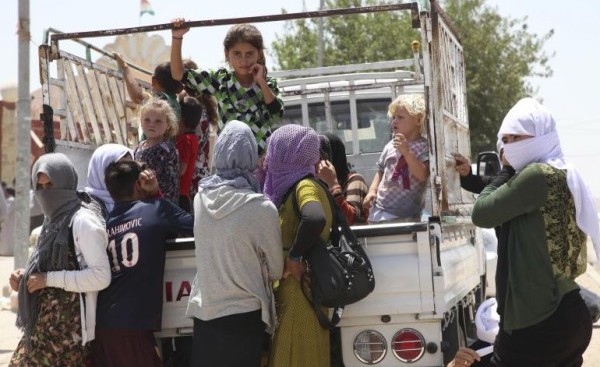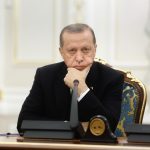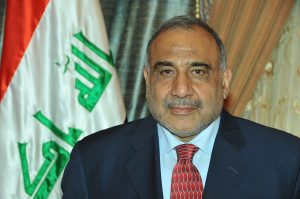by Robert Olson and Derek Davison
The U.S.-led anti-Islamic State (ISIS or IS) coalition is being challenged by a new but fairly predictable problem. Tensions between the Turkish Kurdistan Workers’ Party (PKK), along with its Syrian affiliate, the Democratic Union Party (PYD), on the one hand and the Kurdistan Regional Government (KRG), and its Syrian affiliate, the Kurdish National Council (KNC), on the other could derail Washington’s plans to evict IS from Raqqa. Similarly, Turkish threats to attack the PKK in the Sinjar region could also threaten the campaign to retake Mosul from the IS and eventually pit Iraq and Turkey against each other.
Kurdish Clashes in Syria
One of the most recent clashes in this intra-Kurdish rivalry has been unfolding recently in Rojava, the Kurdish enclave in northern Syria. On December 2, the KNC offices in Amude were attacked by a group allegedly affiliated with the PYD, and a Kurdistan flag was burned. KNC-organized protests broke out against the PYD in Amude, as well as in the nearby town of Qamishli on the Turkish border. Massoud Barzani, the President of Iraqi Kurdistan, condemned the flag-burning, declaring that “those who burn the Kurdistan flag, torture the Kurdish youths will be humiliated, and they will inevitably pay for their crimes.”
Rojavan/PYD security forces denied any involvement in the flag-burning and stressed that security forces did, and will, “protect democratic and oppositional forces, in particular the Kurdish National Council offices, and the Kurdish flag is still flying over their offices.” But the relationship between the rival factions is not good, and PYD security have reportedly arrested 30 KNC leaders and expelled many other KNC members to Iraq.
Tensions between the PYD and the KNC can be traced back to the larger conflict between the Turkey-based PKK and the Iraqi KRG. Those two organizations came to blows during the 1994-1997 Iraqi Kurdistan Civil War, fought between Barzani’s Kurdistan Democratic Party (KDP) and Jalal Talabani’s Patriotic Union of Kurdistan (PUK). The conflict brought in Turks on both sides: the PKK was allied with the PUK, while Ankara backed the KDP. Consequently, the KRG, which is led by Barzani, has close ties to Ankara but remains hostile to the PKK and its presence in northern Iraq.
While both the PYD and the KNC, which was created in part by Barzani in October 2011 to counter the PYD, broadly support the idea of Kurdish autonomy, the two Syrian Kurdish groups have taken different sides in the civil war. The KNC has aligned itself with the opposition Syrian National Council (SNC), although the two councils have differed on their approach to Syrian Kurdish issues. The PYD, on the other hand, settled into an uneasy alliance of convenience — albeit one that could splinter at any time — with the Syrian government. The Amude incident is not the first time the PYD and KNC have nearly come to blows–in August, KNC leader Ibrahim Biro was arrested in Qamishli by PYD police, raising tensions between the two groups. Biro was released the next day, made his way into Iraqi Kurdistan, and harshly criticized the PYD for aligning with Assad and for arresting him over his political activities.
The KNC-PYD rivalry in Syria is both a microcosm of the larger PKK-KRG rivalry and a sign that not all Syrian Kurds are on board with the PYD’s plans for Rojava. But U.S. plans for an assault on Raqqa are heavily reliant on the Syrian Democratic Forces (SDF) to serve as the offensive’s main ground force. The SDF is largely composed of fighters from the People’s Protection Units (YPG), the PYD’s military arm. Any escalation in tensions between the PYD and KNC could put the Raqqa operation in jeopardy by forcing the PYD to redeploy its forces away from Raqqa, thus delaying or disrupting Washington’s drive to oust IS from its capital.
Alternatively, and more seriously, the KNC’s grievances could be taken up by Turkey, which is allied with the KNC through its alliance with Barzani’s KRG in Iraq. Ankara’s Operation Euphrates Shield, which began with a Turkish incursion into northern Syria on August 24, has targeted both IS and the YPG, pitting one U.S. ally against another. A KNC-PYD conflict could give Turkey an additional pretext for taking military action against the YPG.
Sinjar and the PKK
PKK/KRG tensions are also running high in the Sinjar region, home to Iraq’s Yazidi population. Iraqi Kurdish forces recaptured Sinjar from IS in November 2015, 15 months after the KRG’s Peshmerga abruptly retreated from the area in the face of the IS onslaught. Human Rights Watch estimates that as many as 5,500 Yazidis were killed by IS and more than 6,000 others abducted — many of them women who were forced into sexual slavery — since its forces first swept into the region. Some 90 percent of the Yazidi population were displaced,with 180,000 now living in refugee camps in Kurdistan-Iraq, according to HRW.
Now, however, the KRG has imposed a blockade on goods moving into and out of Sinjar, restricting the Yazidi community’s ability to recover, in an apparent effort to force the Yazidis to kick the PKK out of the area. According to HRW, the PKK “has dramatically increased its presence [in Sinjar] since August 2014,” and has recruited a “local branch” of fighters there. Yazidi leaders have gravitated toward the PKK because of the critical role its fighters and those of the PYD played in evacuating and defending their community against IS.
The reasons why the KRG withdrew its forces in the face of the IS offensive remain to be fully clarified. But in his recent book, The Time of the Kurds (in Turkish), Turkish journalist Fehim Tastekin offered one explanation::
Mansur Barzani, the son of Masud Barzani, controlled the area around Zummar [an oil rich region]. In normal times, the Peshmerga would not have withdrawn. The reason for the withdrawal was the Peshmerga’s need for heavy weapons from the Iraqi government and the United States. Barzani thought that by withdrawing, the KRG would put pressure on Baghdad and Washington to deliver the weapons.
Prior to the Sinjar massacre, relations between the PYD and the KRG had been warming. But after Barzani’s Peshmerga abandoned the Yazidis to IS, tensions between the two rose sharply. And it is hardly surprising that the Yazidis themselves feel indebted to the PKK and the PYD and distrustful of the KRG.
The region of Sinjar is vital for both the KRG and the PYD, because it is the geographical and strategic link between the Syrian Kurds and the Iraqi Kurds. It represents the furthest eastward projection of PYD power and the furthest westward projection of KDP power. It is also close to Zummar, one of Iraq’s largest oil fields, and Hasakah, the largest city in northeastern Syria.
Speaking in Dohuq at a conference called “Future Independence of Kurdistan” on December 15, KRG Prime Minister Nechirvan Barzani, the nephew of Massoud Barzani, said that the PKK’s presence in Sinjar was creating instability and was keeping people from returning to Sinjar and rebuilding their homes. Barzani argued that the PKK should understand this and “for the good of the people of Sinjar they should leave the region.” But earlier, in August, the PKK leader in Sinjar, Agid Civan, was quoted as saying that the PKK would leave only after “all of Sinjar is liberated and Yazidis still in IS captivity are rescued.”
The PKK/YPG presence in Sinjar has already prompted Turkish talk about invading Iraq, perhaps with Washington’s acquiescence. On December 4, Gen. Joseph Dunford, chairman of the Joint Chiefs of Staff, met with his Turkish counterpart, General Hulusi Akar, at Incirlik air base. According to a “high-ranking” Turkish source, during that meeting Dunford agreed with Akar that Turkey “had a right to intervene against the PKK if the PKK establishes a permanent base [in Sinjar].” According to this account, Akar succeeded in persuading Dunford that the PKK was trying to turn Sinjar into a second headquarters, similar to the one it has long held in the Kandil Mountains of northern Iraq, from which it has launched operations into Turkey.
The same source said “KRG President Masoud Barzani had told us that he is uncomfortable with the solution and that he could intervene. We told the Americans that if the PKK attempted to turn Sinjar into a second Kandil, it would be a threat to Turkey’s national security, and we would definitely intervene. General Dunford said that under the circumstances of national security, that it would be Turkey’s right.”
On December 16, U.S. Defense Secretary Ashton Carter met with his Turkish counterpart, Fikri Isik, on the sidelines of the “Counter-ISIL Defense Meeting” in London. He thanked “Turkey for its substantial contributions to the counter-ISIL campaign, especially Operation Euphrates Shield, and its efforts to close its border to ISIL.” He did not mention the efforts of the YPG against IS, and praised Turkey’s intervention in Syria despite the fact that the operation has targeted the U.S.-backed YPG, as well as IS forces.
Carter and Dunford are undoubtedly looking to preserve the U.S.-Turkey alliance as much as possible given that the two countries find themselves diametrically opposed when it comes to the role of the Kurds in Syria, so their remarks must be understood in that light. But a Turkish incursion into Iraq to expel the PKK from Sinjar would potentially throw the ongoing offensive to retake Mosul into chaos, and could even escalate into a conflict between Turkey and Iraq, leaving the U.S. in the even more precarious position of having to mediate between two close allies. There is no escaping the fact that the KRG/PKK rivalry is already having significant repercussions on Washington’s anti-IS mission, and risks becoming a more serious problem if it draws Turkey deeper into the situation.
Photo: Yazidis fleeing Sinjar in advance of the IS attack in 2014





